|
|
|
Sort Order |
|
|
|
Items / Page
|
|
|
|
|
|
|
| Srl | Item |
| 1 |
ID:
155401
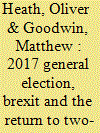

|
|
|
|
|
| Summary/Abstract |
The outcome of the 2017 general election—a hung parliament—defied most predictions. In this article, we draw on aggregate-level data to conduct an initial exploration of the vote. What was the impact of Brexit on the 2017 general election result? What difference did the collapse of UKIP make? And what was the relative importance of factors such as turnout, education, age and ethnic diversity on support for the two main parties? First, we find that turnout was generally higher in more pro-remain areas, and places with high concentrations of young people, ethnic minorities and university graduates. Second, we find that the Conservatives made gains in the sort of places that had previously backed Brexit and previously voted for UKIP. But, third, we find that the gains the Conservatives made from the electoral decline of UKIP were offset by losses in the sort of places that had previously supported the Conservatives, particularly areas in southern England with larger numbers of graduates. The implication of these findings is that while a Brexit effect contributed to a ‘realignment on the right’, with the Conservative strategy appealing to people in places that had previously voted for UKIP, this strategy was not without an electoral cost, and appears to have hurt the party in more middle class areas.
|
|
|
|
|
|
|
|
|
|
|
|
|
|
|
|
| 2 |
ID:
187449
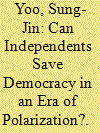

|
|
|
|
|
| Summary/Abstract |
It is evident from the literature that political polarization has played a role in facilitating voter participation. While high participation in a representative democracy is beneficial, it becomes dangerous when this results from intense polarization. This is because polarization has a greater potential to undermine the principles of democratic pluralism. With data from the 21st Korean general assembly, I find that independent voters consider political issues to be important cues for participation even under extreme polarization. Short-term issues such as the government response to COVID-19 that have largely been the concern of independent voters, have had a significant effect on voter participation, and the evaluation of party nominations has also had an impact on turnout among independents. These findings show that Korean democracy has not been completely buried under the influence of polarization and that the political process of representative democracy in Korea is still operating normally thanks to the existence of independent voters.
|
|
|
|
|
|
|
|
|
|
|
|
|
|
|
|
| 3 |
ID:
111507
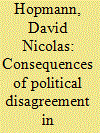

|
|
|
|
|
| Publication |
2012.
|
| Summary/Abstract |
Political disagreement in interpersonal communication increases attitudinal ambivalence and can depress voter turnout. These effects seem to be driven by a wish to avoid social controversy rather than informational gains from encountering other opinions. This article shows that political disagreement in interpersonal communication increases the difficulty of deciding for which party to vote. Moreover, this effect is a result of social disapproval of one's party preference, while political expertise in interpersonal communication has no effect. For voter turnout, no direct effect of social disapproval of one's party preference is found. However, disapproval has an indirect influence on turnout via difficulty of vote choice. In sum, both political attitudes and political behaviour are affected by social pressures. Students of political attitudes and behaviour should try to include interpersonal discussion in their models in greater detail than is common practice today.
|
|
|
|
|
|
|
|
|
|
|
|
|
|
|
|
| 4 |
ID:
170806
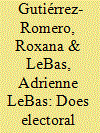

|
|
|
|
|
| Summary/Abstract |
Across many new democracies, voters routinely elect candidates associated with violence. Though electoral violence is common, there is little understanding of how it affects voting behaviour. This article examines how electoral violence affects turnout and vote choice. To this end, a vignette experiment is set in a nationally representative survey in Kenya, where electoral violence has been present since the 1990s. In the experiment, voters choose between two rival politicians. The experiment randomizes candidates’ attributes, their rumoured use of electoral violence and their record of reducing poverty. Conjoint analysis is used to isolate the effects of the candidates’ randomized attributes on turnout and vote choice. In contrast to the assumptions made in the literature on electoral violence, voters are less likely to vote for candidates rumoured to have used electoral violence, even when the candidate is a coethnic or a copartisan. This sanctioning effect, however, is not consistent across all voters. Victims of electoral violence and the poorest respondents are less likely to sanction candidates rumoured to have used violence, especially when these candidates have a good record of reducing poverty. The results show that voting turnout decreases when participants are asked to choose between candidates who are rumoured to have used electoral violence. These results are robust to including respondent and interviewer characteristics that might have affected participation in the experiment and how respondents voted. These findings explain why candidates using violence can win elections and why electoral violence has been difficult to eradicate in settings characterized by clientelism and instances of political discourse justifying the use of violence.
|
|
|
|
|
|
|
|
|
|
|
|
|
|
|
|
| 5 |
ID:
140857
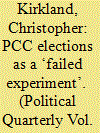

|
|
|
|
|
| Summary/Abstract |
The low turnout of the 2012 police and crime commissioner (PCC) elections have led to questions surrounding their legitimacy and have even led to the former Deputy Prime Minister Nick Clegg describing the elections—elections his party helped to introduce—as a ‘failed experiment’. Despite this, the election of a majority Conservative government in May 2015 appears to offer some longevity to the role of police and crime commissioners and cements next year's PCC elections in the political diary. Concerns in the immediate aftermath of the elections focused upon the costs of the elections. In this article I offer some suggestions as to what lessons could be learned from this experiment and, through exploring the attitudes of voters, political parties and the media, suggest that we can learn four lessons: (1) that spoilt ballots cannot be ignored; that (2) political parties and (3) the media's attitudes toward elections are important in encouraging people to vote; and (4) that high numbers of independent candidates cannot simply be welcomed at times of elections.
|
|
|
|
|
|
|
|
|
|
|
|
|
|
|
|
| 6 |
ID:
103362
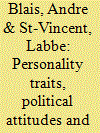

|
|
|
|
|
| Publication |
2011.
|
| Summary/Abstract |
This article examines the link between personality traits, political attitudes and the propensity to vote in elections, using an Internet panel survey conducted in two Canadian provinces at the time of the 2008 federal election and the subsequent provincial elections. It first establishes that the two most proximate attitudes that shape one's propensity to vote are political interest and sense of civic duty. The article then look at specific personality traits (altruism, shyness, efficacy and conflict avoidance) that could affect level of political interest, civic duty and the propensity to vote in elections. In the last part of the analysis, a model is proposed and tested, according to which the impact of personality traits is indirect, being mediated by interest and duty. The article shows that the data are consistent with such an interpretation.
|
|
|
|
|
|
|
|
|
|
|
|
|
|
|
|
| 7 |
ID:
161605
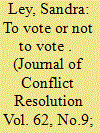

|
|
|
|
|
| Summary/Abstract |
Organized crime-related violence has important electoral consequences. Analyses of aggregate panel data on Mexican elections and an original postelectoral survey conducted in Mexico show that the strategic use of violence by organized crime groups during electoral campaigns demobilizes voters at large. Regions where criminal organizations attempted to influence elections and politics by targeting government officials and party candidates exhibited significantly lower levels of electoral participation. Consistently, at the individual level, results reveal that voters living in regions where organized crime engaged in high-profile violence were more cautious when deciding whether to vote or not. Prior research has focused on the role of crime victimization in nonelectoral participation, but the empirical evidence presented here suggests that the impact of a criminal context on turnout transcends personal victimization experiences.
|
|
|
|
|
|
|
|
|
|
|
|
|
|
|
|
| 8 |
ID:
086979
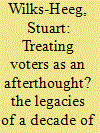

|
|
|
|
|
| Publication |
2009.
|
| Summary/Abstract |
Over the past decade, the UK's New Labour government has been at the forefront of efforts internationally to modernise electoral procedures, promising to deliver 'an e-enabled, multi-channel general election by 2006'. This paper considers the origins and the impacts of reforms to UK electoral procedures with a particular focus on the adoption of postal voting on demand and pilots of electronic voting and counting since 2000. The paper concludes that the principal legacy of the modernisation agenda to date is likely to have been a negative impact on public confidence in the electoral process.
|
|
|
|
|
|
|
|
|
|
|
|
|
|
|
|
| 9 |
ID:
149668
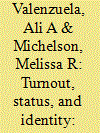

|
|
|
|
|
| Summary/Abstract |
The rise of micro-targeting in American elections raises new questions about the effects of identity-based mobilization strategies. In this article, we bring together theories of expressive voting with literature on racial and ethnic identification to argue that prior studies, which have found either weak or null effects of identity messages targeting minority groups, have missed a crucial moderating variable—identity strength—that varies across both individuals and communities. Identity appeals can have powerful effects on turnout, but only when they target politicized identities to which individuals hold strong prior attachments. Using two innovative GOTV field experiments that rely on publicly available data as a proxy for identity strength, we show that the effects of both ethnic and national identity appeals among Latinos in California and Texas are conditional on the strength of those identities in different communities and among different Latino subgroups.
|
|
|
|
|
|
|
|
|
|
|
|
|
|
|
|
| 10 |
ID:
140855
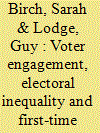

|
|
|
|
|
| Summary/Abstract |
This paper reviews the problem of declining turnout and proposes as a solution a system whereby each elector would be legally obliged to vote in the first election for which they were eligible. Popular attitudes toward first-time compulsory voting are measured and probed by means of UK data. The main findings of the paper are that first-time compulsory voting is a politically and administratively feasible proposal that appears tentatively to command popular support and has the potential to help address a number of the problems associated with declining turnout, and in particular low rates of electoral participation among younger citizens.
|
|
|
|
|
|
|
|
|
|
|
|
|
|
|
|
| 11 |
ID:
100987
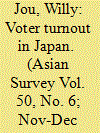

|
|
|
|
|
| Publication |
2010.
|
| Summary/Abstract |
This study examines the effects of socio-demographic and political factors on district level turnout in the 2005 and 2009 Japanese general elections. Results show that marginality is a strong predictor of turnout, while the effects of age structure, joblessness, and primary sector employment vary across elections.
|
|
|
|
|
|
|
|
|
|
|
|
|
|
|
|
| 12 |
ID:
120131
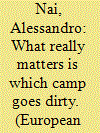

|
|
|
|
|
| Publication |
2013.
|
| Summary/Abstract |
Using individual data on Swiss federal ballots (VOX data) and an original dataset on the evolution and content of political campaigns, this article elucidates how negative campaigning influences individual turnout during Swiss federal ballots. It hypothesises that the effect of negativism on turnout depends on 'which camp goes dirty' and, specifically, on the direction of the political campaign ('status quo' versus 'policy change' campaigns). A series of multilevel models provide strong support for the hypotheses, by showing that high negativism in 'status quo campaigns' decreases individual turnout, whereas high negativism for 'policy change campaigns' increases it. It is argued here that this could depend on the emotional responses triggered by negativism in political campaigns.
|
|
|
|
|
|
|
|
|
|
|
|
|
|
|
|
|
|
|
|
|